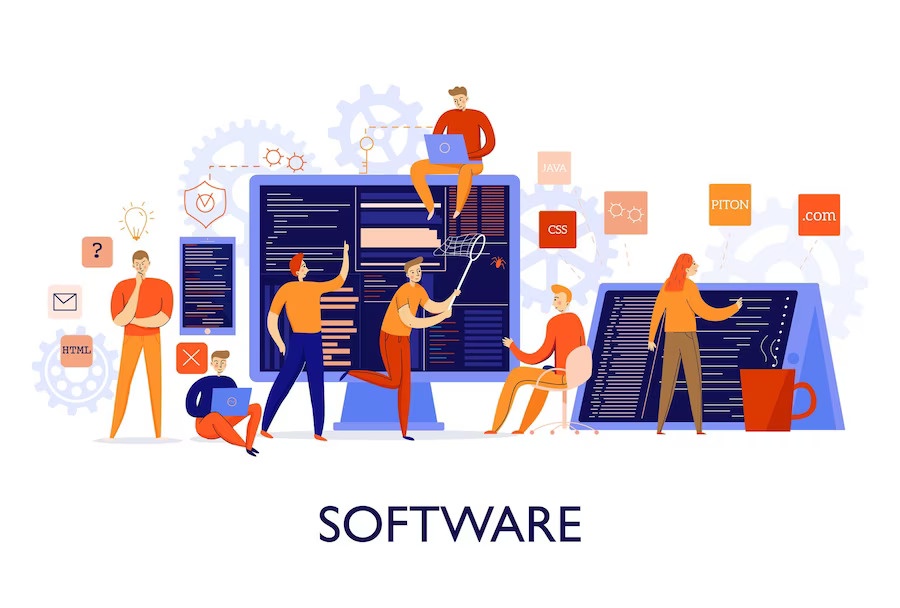When technology evolves and becomes more efficient and complex, software systems need to be updated accordingly to keep pace with contenders and fulfill end-user demands. The healthcare software system is no exception. It is imperative for healthcare software systems to support integrated patient records, and maintain HIPAA compliance, precise reporting, and security.
Inefficiencies in healthcare systems can result in massive administrative overhead, unstructured scheduling, and many other negative causes. Finally, they can impact both patient and medical staff satisfaction. However, to meet the demands and overcome inefficiencies, healthcare enterprises should team up with the right software maintenance services provider for robust healthcare software upgradation and maintenance.
Introduction to Software Maintenance
Software maintenance is the procedure of altering, modifying, and updating existing software to keep up with both tech requirements (coding library updates, new browser versions, new operating systems, or mobile devices) and customer needs. Software maintenance is performed post-deployment in order to resolve bugs or issues and improve overall performance.
Importance of Software Maintenance for Healthcare
When it comes to efficient operations, healthcare institutions often rely on legacy software systems. However, legacy systems often fail to keep pace with modern user requirements, largely due to poor integration support. Since legacy systems are decades-old, enabling integrations through APIs to legacy software can be expensive and time-consuming. In addition, outdated software architecture might have mounds of documentation, making it even more difficult for healthcare organizations to perform updates on their own.
Hence, healthcare organizations can outsource the maintenance of their software entities to a recognized offshore company. With strong technical expertise and a maintenance plan, dedicated experts can ensure healthcare software products’ longevity and robustness.
3 Key Maintenance Approaches for Healthcare Software
- Proactive Maintenance
Proactive healthcare software maintenance involves the forecasting of potential issues and the implementation of measures intended to prevent them from impacting the users and system. In the same way that vital signs are observed, maintenance experts monitor the health of software 24/7 to keep them secure, protected and maintained. Server outages, low disk space, failed backup jobs, storage failures, and malware activity are some of the key technology metrics that maintenance experts monitor to ensure healthcare system continuity.
- Reactive Maintenance
Reactive maintenance of healthcare software involves resolving bugs and reacting rapidly to security threats when they appear. Though proactive maintenance is ideal for forecasting issues, reactive maintenance allows healthcare institutions to remain responsive to unforeseen events. For instance, healthcare companies may anticipate a huge influx in traffic and take active measures to scale efficiently. But sometimes surges in software utilization are unpredictable, and a reactive maintenance plan allows companies to respond quickly and increase scalability when increased utilization is detected. Reactive healthcare software maintenance may also include security updates to the software or server, and improvements to software speed and performance.
- Hosting and Infrastructure Maintenance
This might include reviewing an active healthcare software’s infrastructure, organizing the code and documentation to resolve possible issues as well as patching and updating. It also involves enhancing the solution’s performance, for instance by combining all common purpose applications and fractioning the biggest monoliths into microservices.
Some of the factors involved in maintaining healthcare software infrastructure include:
- Uptime – Uptime is the amount of time that healthcare software has been functioning and available to users. The greater the uptime, the more reliable will be healthcare software. Maintenance experts can help healthcare institutions shift software operating model from shared web hosting to virtual private hosting. This way, enterprises can reduce administrative issues.
- Monitoring – Maintenance experts can monitor the stability of the virtual servers hosting healthcare software in order to eliminate degraded performance or downtime. In addition, experts also monitor the software to enable new security patches or a new type of code library to boost the performance of the software.
- Scalability – Maintenance experts can improve storage, bandwidth, or other hosting-related resources that healthcare software may need in order to continue to work effectively when the user base grows.
Overall Benefits of Healthcare Software Maintenance
- Improved Performance - Healthcare software can become bogged down with glitches and bugs, causing it to reduce speed or stop working altogether. Regular maintenance ensures that these problems are addressed, enhancing the software’s overall performance.
- Enhanced Security - Healthcare software comprises sensitive medical information, and it must be protected against cyberattacks and data breaches. Regular maintenance ensures that healthcare software is up-to-date with modern security updates, making it more protected.
- Reliability - When healthcare software isn’t maintained, it can become defective, causing downtime and impacting patient care. Steadfast maintenance helps in ensuring that the software remains reliable, lessening the risk of downtime and guaranteeing that patients obtain the best possible care.
- Strong Compliance – Healthcare software should adhere to strict regulatory standards, and non-compliance can give rise to poor management. By hiring experts from the right software maintenance and support services provider, healthcare institutions can ensure that their software is compliant with all relevant standards and regulations, protecting them from legal consequences.
Summing Up
Maintaining a software system is as crucial as the development stage. It keeps software ready to deal with the evolving technical and business environment and helps eliminate cyberattacks that could put healthcare data at risk. Software maintenance experts can devise a robust and comprehensive maintenance plan to enhance healthcare software’s usability by fulfilling security and compliance needs.


No comments yet